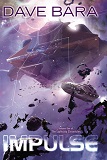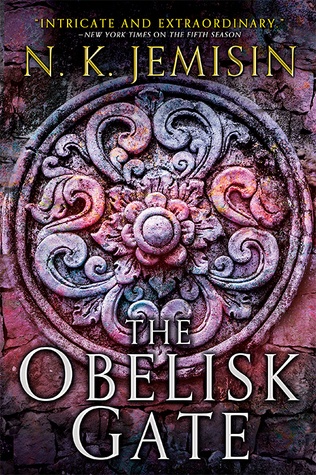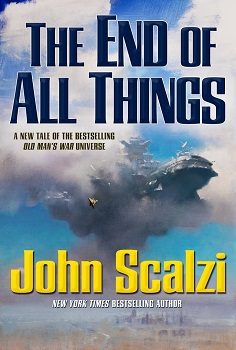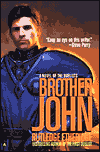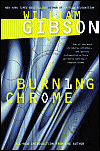
Burning Chrome, by William Gibson
Book Review by Jack Mangan
Have you read this book?
It is my great privilege to write the review for William Gibson's Burning Chrome. For me, as a reader, writer, cyberpunk/science fiction/literature enthusiast, and reviewer, this is THE quintessential short story compilation. I know he'd probably prefer a comparison to Lou Reed or Nick Cave, but Gibson's writing is eerily analogous to the best music of AC/DC. The songs and the stories are edgy, gritty, and unflinching, with memorable, devastatingly good openings. (I could go on with this, but I'll get back to the review at hand). Burning Chrome is a true screen capture of Cyberpunk in its neon glory, containing all the requisites of this lost(?) Science Fiction sub-genre. The themes of loss, desperation, and sexual and emotional disconnection reverberate throughout. William Gibson's use of "rose" imagery is also ever-present here, as seen in even in his most current novel, "Pattern Recognition".
I like every story in this collection -- but here they are, in order of preference, along with their opening lines:
"Dogfight" -- co-written with Michael Swanwick. "He meant to keep on going, right down to Florida." This is possibly my favorite short story of all time. Deke is a classic Gibson hard-knocked low-life. He becomes embroiled in this game of dueling holographic planes, played out above a pool table at a highwayside truck stop. Tiny Montgomery, a wheelchair-bound regular, dominates the table, defending the Blue Max medal and building his reputation as dogfight master. Deke establishes a connection of mutual desperation and emptiness with a fragile girl in his hotel, while becoming obsessed with beating Tiny.
"New Rose Hotel". "Seven rented nights in this coffin, Sandii." Familiar Gibson themes; the protagonist pines and aches for Sandii, with whom he'd shared a brief relationship of mutual need and loneliness, with whom he and a partner had become embroiled in a high-stakes scheme. The plan is to use her to defect a brilliant scientist from one corporation to another. Read the story, skip the movie version, if you can resist.
"The Winter Market". "It rains a lot, up here; there are winter days when it doesn't really get light at all, only a bright, indeterminate gray." It wasn't until I read this again recently that I fully appreciated what Mr. Gibson was trying to do. Nothing less than an ambitious guess at the future of art and pop-art, set in his filthy, gleaming world of cybernetics and shared sensory experiences. It's a story of magnificent depth and intelligence. The writing skills are in full evidence here; even the crustiest of literary snobs would have to concede Gibson's prose mastery in this one.
"The Belonging Kind" co-written with John Shirley. "It might have been in Club Justine, or Jimbo's, or Sad Jack's, or the Rafters; Coretti could never be sure where he'd first seen her." Good stuff. Coretti is a loner, who after a brief meeting with a woman at a bar, learns that she's part of a chameleon race, living amongst us. They dwell and merge into the scenes in the city's various bars, both upscale and seedy. His job and day life become sacrificed to his subsequent obsession, as he searches the city bars for another glimpse of her and her "Belonging Kind". This story is unlike any of the others in the collection.
"Burning Chrome". "It was hot, the night we burned Chrome." The precursor to Neuromancer, set in his Sprawl world and even featuring the Finn character, filled with the standard Gibson ingredients: desperation, loneliness, loss, lowlifes in high-tech. The core Cyberpunk phrase, "the street finds its own uses", was coined here. This is where Gibson first introduced us to his Net, to his Cyberspace.
"Hinterlands". "When Hiro hit the switch, I was dreaming of Paris, dreaming of wet, dark streets in winter." As I mention in my review of Bruce Sterling's "Islands in the Net" SF writers of the 70s and 80s often transplanted the Cold War into the future, which essentially makes them alt-future history for contemporary readers. "Hinterlands" is such a story, with the Soviets still a powerful entity, still running a formidable space program and working only reluctantly and uneasily aside Americans. The story survives this, however, and offers a chilling, disturbing depiction of contact with an advanced alien species. The method of contact is unlike most imaginings though; individual astronauts alone are accepted as passengers on the aliens' "highway", and are usually returned with their minds shattered beyond recovery, sometimes bearing artifacts containing small, yet major morsels of information.
"Red Star, Winter Orbit", co-written with Bruce Sterling, is another future Cold War story. "Colonel Korolev twisted slowly in his harness, dreaming of winter and gravity." These are arguably the two best science fiction authors of the 80s, and this is a great story -- for its time, and even somewhat for the new millennium. I'd love to see these guys revisit and update "RS, WO". Set in a future where the USSR never collapsed, and has basically outlasted an increasingly obsolete US to become the world's only superpower, Korolev, an aging cosmonaut and Soviet hero, has spent so much time in zero-G that his withered body is no longer fit for Earth's gravity. So what can he do when Moscow decides that space is no longer important, and calls for his satellite to be abandoned and its orbit to be decayed?
"Fragments of a Hologram Rose". "That summer Parker had trouble sleeping." This was his first published story. It's clearly the beginning of a brilliant career, about a guy seeking solace in drug-induced sleep. "Fragments" is good -- very good, but Gibson would only get better.
"The Gernsback Continuum". "Mercifully, the whole thing is starting to fade, to become an episode." This one is a bit different. After getting an assignment to photograph latent evidence of 1930s visions of the future, the protagonist begins to see his bizarre subjects manifesting fully in the real world. Sprawling, multi-tiered city highways appear, with ubermensch flying in impossible airships and taking food pills for meals. The story is crafted with real intelligence and attention to trends of design.
"Johnny Mnemonic" "I put the shotgun in the Adidas bag, padded it with four pairs of tennis socks, not my style at all, but that's what I was aiming for: If they think you're crude, go technical; if they think you're technical, go crude." "JM" is the classic Cyberpunk action story. Worth a look, especially for Neuromancer fans eager to glimpse more of Molly in action. Just block out the mental image of Keanu Reeves while reading. It's actually most readers' favorite story in Burning Chrome.
http://jackmangan.blogspot.com
I like every story in this collection -- but here they are, in order of preference, along with their opening lines:
"Dogfight" -- co-written with Michael Swanwick. "He meant to keep on going, right down to Florida." This is possibly my favorite short story of all time. Deke is a classic Gibson hard-knocked low-life. He becomes embroiled in this game of dueling holographic planes, played out above a pool table at a highwayside truck stop. Tiny Montgomery, a wheelchair-bound regular, dominates the table, defending the Blue Max medal and building his reputation as dogfight master. Deke establishes a connection of mutual desperation and emptiness with a fragile girl in his hotel, while becoming obsessed with beating Tiny.
"New Rose Hotel". "Seven rented nights in this coffin, Sandii." Familiar Gibson themes; the protagonist pines and aches for Sandii, with whom he'd shared a brief relationship of mutual need and loneliness, with whom he and a partner had become embroiled in a high-stakes scheme. The plan is to use her to defect a brilliant scientist from one corporation to another. Read the story, skip the movie version, if you can resist.
"The Winter Market". "It rains a lot, up here; there are winter days when it doesn't really get light at all, only a bright, indeterminate gray." It wasn't until I read this again recently that I fully appreciated what Mr. Gibson was trying to do. Nothing less than an ambitious guess at the future of art and pop-art, set in his filthy, gleaming world of cybernetics and shared sensory experiences. It's a story of magnificent depth and intelligence. The writing skills are in full evidence here; even the crustiest of literary snobs would have to concede Gibson's prose mastery in this one.
"The Belonging Kind" co-written with John Shirley. "It might have been in Club Justine, or Jimbo's, or Sad Jack's, or the Rafters; Coretti could never be sure where he'd first seen her." Good stuff. Coretti is a loner, who after a brief meeting with a woman at a bar, learns that she's part of a chameleon race, living amongst us. They dwell and merge into the scenes in the city's various bars, both upscale and seedy. His job and day life become sacrificed to his subsequent obsession, as he searches the city bars for another glimpse of her and her "Belonging Kind". This story is unlike any of the others in the collection.
"Burning Chrome". "It was hot, the night we burned Chrome." The precursor to Neuromancer, set in his Sprawl world and even featuring the Finn character, filled with the standard Gibson ingredients: desperation, loneliness, loss, lowlifes in high-tech. The core Cyberpunk phrase, "the street finds its own uses", was coined here. This is where Gibson first introduced us to his Net, to his Cyberspace.
"Hinterlands". "When Hiro hit the switch, I was dreaming of Paris, dreaming of wet, dark streets in winter." As I mention in my review of Bruce Sterling's "Islands in the Net" SF writers of the 70s and 80s often transplanted the Cold War into the future, which essentially makes them alt-future history for contemporary readers. "Hinterlands" is such a story, with the Soviets still a powerful entity, still running a formidable space program and working only reluctantly and uneasily aside Americans. The story survives this, however, and offers a chilling, disturbing depiction of contact with an advanced alien species. The method of contact is unlike most imaginings though; individual astronauts alone are accepted as passengers on the aliens' "highway", and are usually returned with their minds shattered beyond recovery, sometimes bearing artifacts containing small, yet major morsels of information.
"Red Star, Winter Orbit", co-written with Bruce Sterling, is another future Cold War story. "Colonel Korolev twisted slowly in his harness, dreaming of winter and gravity." These are arguably the two best science fiction authors of the 80s, and this is a great story -- for its time, and even somewhat for the new millennium. I'd love to see these guys revisit and update "RS, WO". Set in a future where the USSR never collapsed, and has basically outlasted an increasingly obsolete US to become the world's only superpower, Korolev, an aging cosmonaut and Soviet hero, has spent so much time in zero-G that his withered body is no longer fit for Earth's gravity. So what can he do when Moscow decides that space is no longer important, and calls for his satellite to be abandoned and its orbit to be decayed?
"Fragments of a Hologram Rose". "That summer Parker had trouble sleeping." This was his first published story. It's clearly the beginning of a brilliant career, about a guy seeking solace in drug-induced sleep. "Fragments" is good -- very good, but Gibson would only get better.
"The Gernsback Continuum". "Mercifully, the whole thing is starting to fade, to become an episode." This one is a bit different. After getting an assignment to photograph latent evidence of 1930s visions of the future, the protagonist begins to see his bizarre subjects manifesting fully in the real world. Sprawling, multi-tiered city highways appear, with ubermensch flying in impossible airships and taking food pills for meals. The story is crafted with real intelligence and attention to trends of design.
"Johnny Mnemonic" "I put the shotgun in the Adidas bag, padded it with four pairs of tennis socks, not my style at all, but that's what I was aiming for: If they think you're crude, go technical; if they think you're technical, go crude." "JM" is the classic Cyberpunk action story. Worth a look, especially for Neuromancer fans eager to glimpse more of Molly in action. Just block out the mental image of Keanu Reeves while reading. It's actually most readers' favorite story in Burning Chrome.
http://jackmangan.blogspot.com
|
Click here to buy Burning Chrome, by William Gibson on Amazon
|
Burning Chrome, by William Gibson on Amazon

| More Books You Might Like |
Comment on Burning Chrome, by William Gibson
